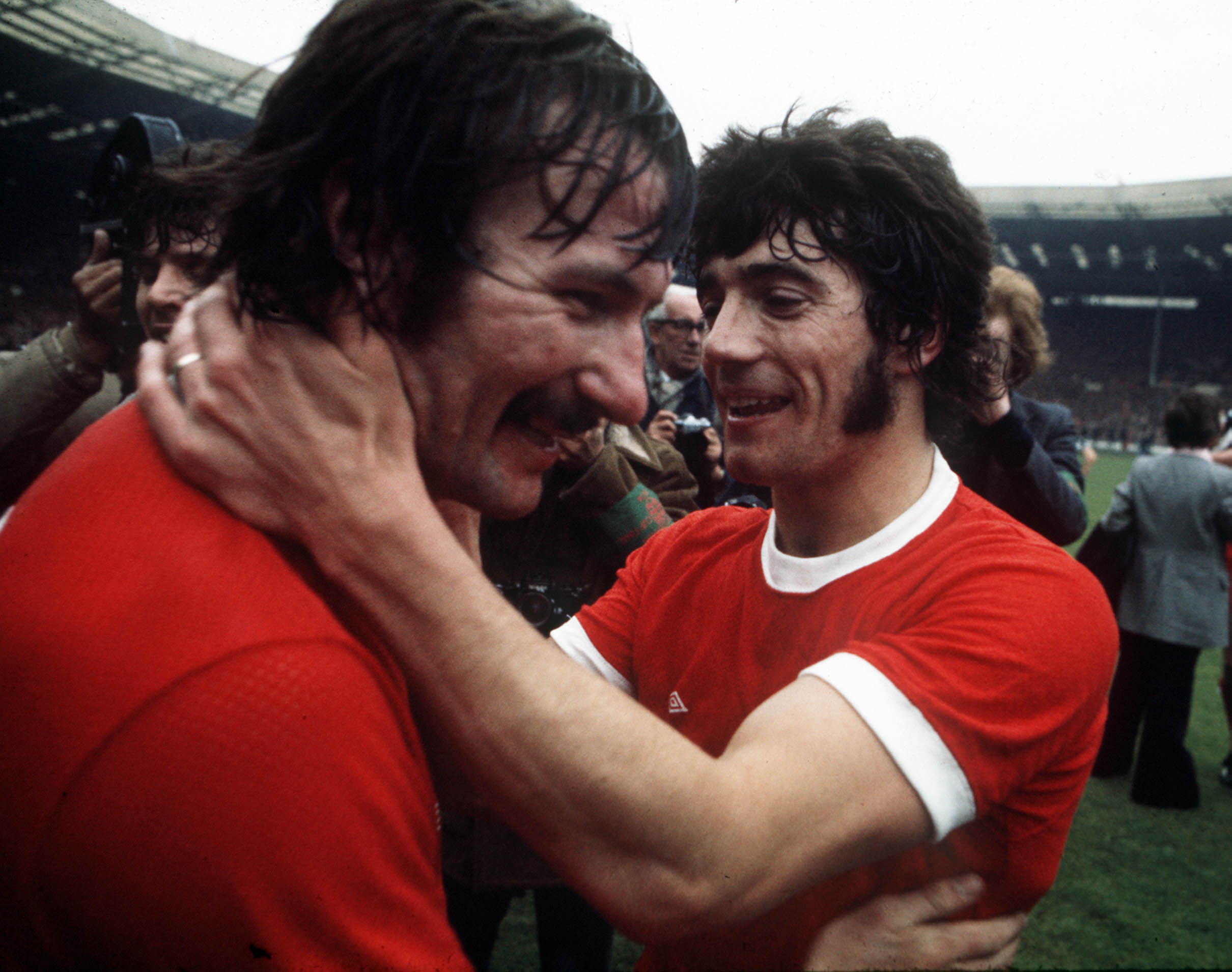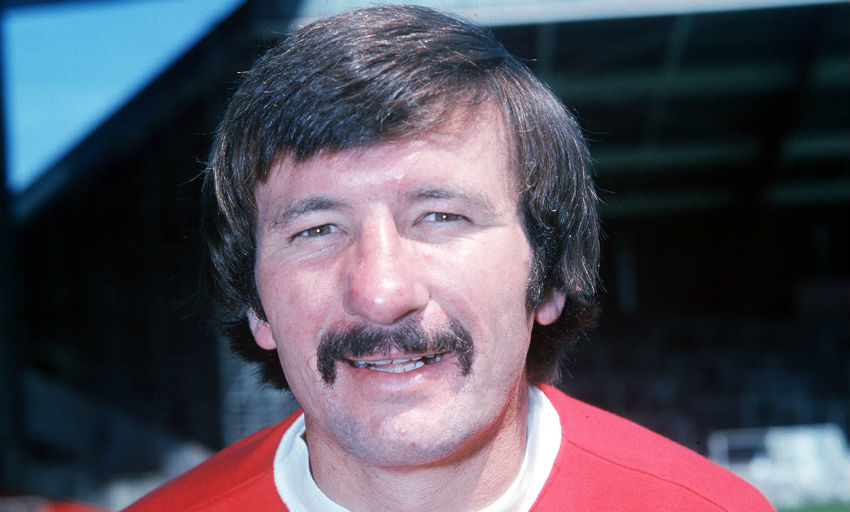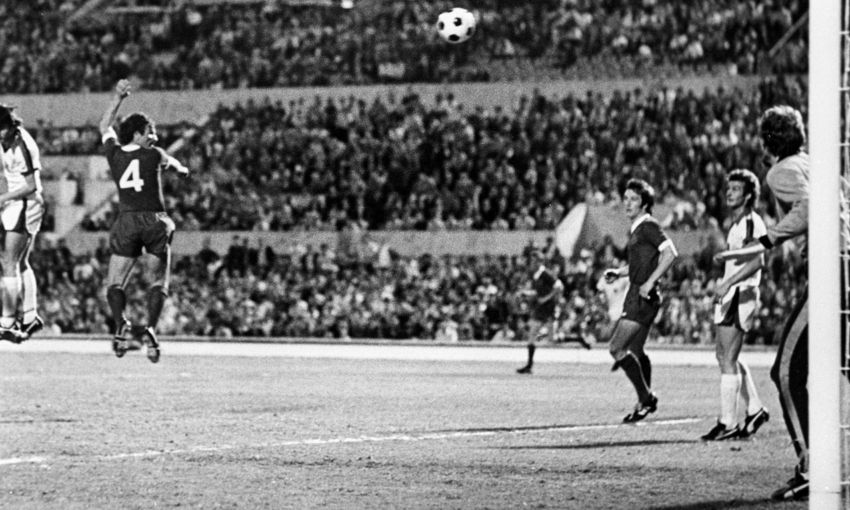'Fairy tales don't come more extraordinary than this'
"I changed the name on my passport - 'Roy of the Rovers'. You think about things, and you can plan and do all that, but you just can't plan for things like this. This is football, through and through, all the way round."
So said Tommy Smith on May 26, 1977, during the sunny summer afternoon when Liverpool paraded the European Cup through the streets of their home city for the very first time. Fewer than 24 hours earlier, on the same day that Star Wars: A New Hope was released and changed the course of cinema forever, Tommy had changed the course of Liverpool Football Club forever with one firm flick of his forehead.
Smith’s goal was the decisive moment in the 3-1 triumph over Borussia Monchengladbach at Stadio Olimpico 42 years ago today, finally delivering the prize Liverpool had coveted more than any other.
The line ‘When we won the European Cup in Rome/Like we should have done years before’ in Every Other Saturday is significant; Liverpool felt Ol’ Big Ears could and should have been theirs as far back as 1965, when a Bill Shankly side featuring a 20-year-old Tommy - playing at No.10, no less - was narrowly and controversially ousted by Inter Milan in the semi-finals. Other than his close friends Ian Callaghan and Ronnie Moran, ‘Smithy’ was the only remaining link to the ’65 team on that famous night in the Eternal City 12 years later. But that’s only one of the reasons why, if you look the goal up on YouTube, the commentary features the phrase: “Fairy tales don’t come more extraordinary than this.”
Tommy was born - not quarried, as Shankly would have had you believe - five months before the end of World War II and grew up close to Anfield. An only child, he lost his father aged just 14 and signed for the club aged 15, his mother having promised Shankly that her son would be the one to end Liverpool’s long wait for a maiden FA Cup victory. That rather bold claim would come to fruition five years later at Wembley, but there was a lot of hard graft to be put in before then.
“When Tommy and Chris Lawler joined Liverpool they were on what was called the ‘ground staff’,” former Daily Express journalist John Keith explains. “It doesn’t exist today but that meant they used to sweep up rubbish at the ground and carry out maintenance work. Tommy remembered that one of the first things when he walked in was [Bob] Paisley giving him a hacksaw and saying, ‘Come on, son, I want you to saw this bar off on the terraces.’ To think that lad was still there in 1977, helping the club secure the European Cup, is quite remarkable.”
Eventually relocated from attacking midfield to central defence, as other players came and went Smith was an immovable fixture in the Reds XI throughout the late 1960s and early 1970s, making at least 40 appearances in every season between 1964 and 1975.
He assumed the captaincy in 1970, one year before an unheralded striker arrived from Scunthorpe United of the Fourth Division: Kevin Keegan.
“Tommy was like a father figure to me, he was our leader,” Keegan tells Liverpoolfc.com. “Underneath Bill Shankly and Bob Paisley, Tommy managed the players, and he was a terrific guy. He looked after people like me when we came, and by ‘looked after’ I mean, if we did anything wrong, he told you!”
His influence behind the scenes even extended to playing a role in Roy Evans’ move into coaching, when the future Liverpool manager retired early from playing in 1974.
“In my case, he was great for me early on in my career, giving me a bit of confidence and sometimes giving me a bit of a kick up the backside as well,” states Evans. “We were good friends and he was best man at my wedding. Tommy encouraged me to take the job [as reserve team coach]. I didn’t want to, I wanted to get in the first team and stay there, but when they say, at the age of 26, ‘Do you want to be a coach?’, there’s a bit of a message there! And Tommy, along with the likes of Bob, Ronnie and Joe [Fagan], encouraged me to take it.”
The mid-to-late 1970s brought a series of challenges to Smith’s status as one of the first names on the teamsheet.
In 1973, he was replaced as captain by Emlyn Hughes, who then moved from midfield into central defence. Combined with Phil Thompson’s emergence in that position it necessitated a move to full-back for Tommy, but even there he had his work cut out after Paisley brought young defenders Phil Neal and Joey Jones to the club.
“He kept reinventing himself,” Keegan recalls. “A bit slow to be a midfield player so he took over in central defence because he read the game well and people were scared of him, and then he had to go out to the right. He was one of these guys that just didn’t want to go out of the team, he kept banging away. He was a clever, clever player, because every time a problem came along for him in the team, he found a way to make the manager pick him. Everyone called him ‘The Ironman’, and he was - he was resilient.”

At the beginning of the 1976-77 campaign, Smith was 31; not a veteran by today’s standards, but his record said otherwise, with more than 500 Liverpool appearances under his belt and a medal collection to envy.
It had been agreed in advance that this would be Keegan’s last season at Anfield, and Tommy was in the same boat, but where a transfer to Hamburg and back-to-back Ballon d’Ors were round the corner for the former, the latter’s future - beyond a testimonial scheduled for a few days after the season ended - was more uncertain.
The Liverpool side that retained its First Division title that year was so strong that for once the wily Scouser could not break into it, making just six appearances between August and March. But then, as fate would have it, Thompson suffered an injury, and suddenly Smith’s old central defensive berth was beckoning to him again. He slotted straight in next to Hughes and played every remaining fixture that term, including the FA Cup final against Manchester United and, of course, the European Cup final.
Even the graininess of the old footage cannot obscure how much he relished every second of those 90 minutes in the Italian capital. When he wasn’t launching unerringly accurate long passes to the Liverpool forwards, the 32-year-old was tearing over the halfway line to let Gladbach forward Jupp Heynckes know he was there, so to speak.
His special moment came when Liverpool won a corner on the left with the score at 1-1 and just over 25 minutes to play. Steve Heighway’s unusual goal-kick-style delivery - long run-up, leaning forward and not back - meant that the ball absolutely zoomed in towards the front-post area, and there he was, the former binman, soaring through the air and leaving two Gladbach men in his shadow to power a header into the top corner.
“Oh, yes, and what a delighted scorer, it’s Tommy Smith!” cried BBC commentator Barry Davies, with one of those classic lines that any Liverpool fan of a certain age can instantly recall. “Oh, what an end to a career.”
Not especially tall for a defender, it was Tommy’s first goal in any competition since a league match against West Ham United two-and-a-half years prior.
“It was a sensational contribution, and one that says it all about Tommy and how over-attributed he was with character,” says Keith. “Nobody, including Ian Callaghan and myself, can remember him scoring another headed goal. Apparently there was one years before, but they were about as rare as hen’s teeth.”

Keegan laughs: “The greatest thing ever was when he scored that header. No-one even knew why he was going up there, he was supposed to stay back! He wasn’t even 6ft, he was about 5ft10. It couldn’t have happened at a better time for him. We’d won the league, lost the FA Cup final, then his testimonial was the following Wednesday, and you can imagine, they could have sold Anfield out 10 times.”
After Phil Neal’s late penalty sealed the result and the trophy was handed out, Tommy decamped to a hotel room to share a celebratory carryout with Callaghan, the coaching staff and Gladbach captain Berti Vogts, of all people, before returning to Merseyside the following day for the parade. It was only on that slow procession from the airport into the heart of the city that the magnitude of what they had achieved truly dawned on the players.
“We’d won the league a couple of times, the UEFA Cup a couple of times, we’d won the FA Cup, but even by the standards of the time, when we came back from Rome that was something else. From Speke Airport to the town centre is a fair few miles, but it was rammed all the way,” adds Keegan.
So, what do you do when you’ve just conquered Europe? You shuffle through the door of the family home and start planning a holiday, apparently.
“I just remember him coming home and coming in the door,” Tommy’s daughter, Janette Simpson, who was nine years old at the time, recalls. “He wasn’t jumping up and down, he was just happy, making plans for our holidays and things like that.”
“He was just a regular dad. I always called him a big softie because he was dead hands-on, he used to come shopping with us and eat more sweets than we did. The hardman thing, it was all about winning the game before you got on the pitch.”
Keegan, meanwhile, continues: “There’s a great picture of Tommy with the trophy [during the parade], holding his hands up, and I think if he was still here he would probably say that was his greatest moment. That, everyone thought, was the end for Tommy. But Tommy didn’t think that.”
Indeed, Davies had been mistaken - that goal in Rome was not the end to a career after all.
Smith signed on for another year at Anfield, and it was no half-hearted farewell tour either. He was a first-team regular, clocking up 34 appearances in total, and may well have started when the club secured back-to-back European Cups with a 1-0 win over Club Brugge at Wembley, had he not dropped a pickaxe on his foot the month before. He then spent a summer with the Los Angeles Aztecs, and a season with Swansea City in the Third Division, before retiring aged 34 in 1979 and becoming a prominent media personality around Liverpool.
He remained eternally grateful to have played a starring role in arguably the club’s greatest night, but his legacy entails more than that one moment.
“The biggest legacy, for me, is that he was a Liverpool lad, a Scouser, like Chris Lawler and Ian Callaghan,” remarks Evans. “They came through the system and went into the B team, the A team, the reserves, and eventually into the first team, and most of them went on to play for their countries. That was the start of Liverpool, for me. When Shankly arrived in the late 1950s, Liverpool came alive, and those lads were the ones that took us forward to be a title-winning team.”
Keegan concludes: “He probably played two years longer than he should have done at that level purely because of his determination and his attitude.
“When people ask me what he was like, more than anything he was determined. Determined to win things, determined to do things right, determined to stay in the team as long as he could and to see that everyone treated the club with respect. He was just a great leader. Everyone thinks there’s lots of leaders in football but there aren’t that many. There’s leaders like Tommy and then there’s people who come following that look like leaders.
“I never met anyone like him in football, and I played for a long time. Just an incredible human. For me, I’d put him in the top three people I’ve ever met in football, as a person, and for getting the most out of his ability I’d put him top. Whatever strengths he had, he got them out there, and that’s why he stood the test of time.”
Photographs of those scenes at the Olimpico on May 25, 1977 can be found in pubs and houses all over Merseyside, and it’s in these photos - like the one Janette chose for the order of service at his funeral - that Tommy, who passed away aged 74 in April, lives on.
“My dad had false teeth, he knocked his front teeth out at a very young age,” she says. “He used to give Ronnie Moran the teeth during a game, so at the end of the game he ran over to Ronnie to get his teeth back! In the photo Ronnie is lifting him up, and he’s smiling away. He’s just grinning and he’s got no teeth in, bless him.”



